Ranked: 54 retro dishes we think deserve a comeback
Back on the menu?

nelea33/Shutterstock
Can you tell the difference between Salisbury steak and steak Diane? Do you remember vol-au-vents and banana splits? Sadly, these dishes that once graced dinner tables and restaurant menus have fallen out of fashion or simply been forgotten. Some might argue that the nostalgic treats are best left in the past, but we think they deserve a second chance. Here, we reveal the bygone dishes worthy of a comeback, counting down to the one we most want to see return.
Read on to discover the old-school dishes we think should make a return.
We've based our ranking on the enduring popularity of each dish, and on the opinions of our well-travelled (and well-fed) team. This list is unavoidably subjective.
54. Battenberg cake

David Pimborough/Shutterstock
Nothing screams nostalgia more to a Brit than a slice of Battenberg cake. Reportedly named because it was first made to celebrate the 1884 marriage of Prince Louis of Battenberg and Princess Victoria, the Battenberg cake is a simple sponge with multicoloured sections surrounded by marzipan. It makes a perfect addition to a traditional afternoon tea.
53. Shoofly pie

MShev/Shutterstock
A pretty niche American dessert, shoofly pie is believed to have been developed by the Pennsylvania Dutch in the 19th century and consists of molasses, brown sugar and cinnamon, encased in a flaky crust. What's not to like, right? This pie has been relegated to the past now, but we think it's worthy of reassessment.
52. Porcupine meatballs

from my point of view/Shutterstock
Don't worry: no porcupines were harmed in the making of this dish. It's so-called because the meatballs are embedded with long-grain rice to give the dish its signature look and taste. The recipe is a product of its era – the early 20th century – when people had to find creative ways to make their meat go further. Yet these saucy meatballs are surely ripe for rediscovery in restaurants and homes around the world.
51. Tunnel of fudge cake
![<p>Elaine Ashton/Flickr [CC BY-ND 2.0]</p>](https://s.yimg.com/ny/api/res/1.2/k4QQ1F7oiWYXLpaK.04h5g--/YXBwaWQ9aGlnaGxhbmRlcjt3PTk2MDtoPTYxOQ--/https://media.zenfs.com/en/lovefood_uk_306/d0c70be2536ca2fb02cf67f71f081cdc)
Elaine Ashton/Flickr [CC BY-ND 2.0]
The tunnel of fudge cake was a rich chocolate and nut bundt cake, with a fudgy tunnel running through the centre. It was introduced in 1966, when it won second prize at the Pillsbury Bake-Off Contest. Despite losing to Golden Gate Snack Bread, it became Pillsbury’s most-requested recipe and single-handedly brought bundt cakes into fashion. If you like the texture of gooey brownies, you’ll love this.
50. Tunis cake

CharlotteBG87, CC BY-SA 4.0, via Wikimedia Commons
If fruit cake isn't your thing at Christmas, perhaps you could try Tunis cake next time. It's simply a thick Madeira sponge topped with a healthy dollop of chocolate and marzipan decorations. The cake seems to date from the Edwardian era, though it was most popular in Britain between the 1930s and the 1980s. Brits were particularly delighted when a Tunis showed up on the shelves of a popular supermarket in 2024, so perhaps this one will make a full comeback soon.
49. Ambrosia
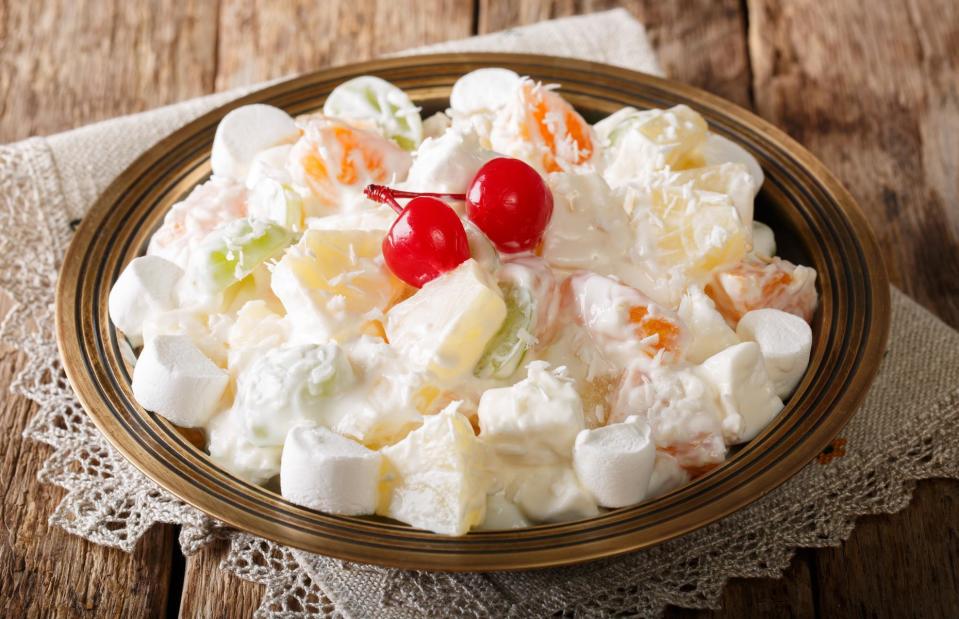
AS Food studio/Shutterstock
In the early 20th century, ambrosia fruit salad was ubiquitous at celebrations throughout the Southern US. At its most basic, it was a combination of sliced pineapples and oranges, mixed with whipped cream – but there were many variations, including ones that used tinned fruit cocktail, marshmallows, maraschino cherries, bananas, strawberries, grapes, yogurt or cream cheese. It was once a luxury dish, and while nowadays the dessert is far from upmarket, it still makes a quick and tasty treat.
48. Anything in aspic
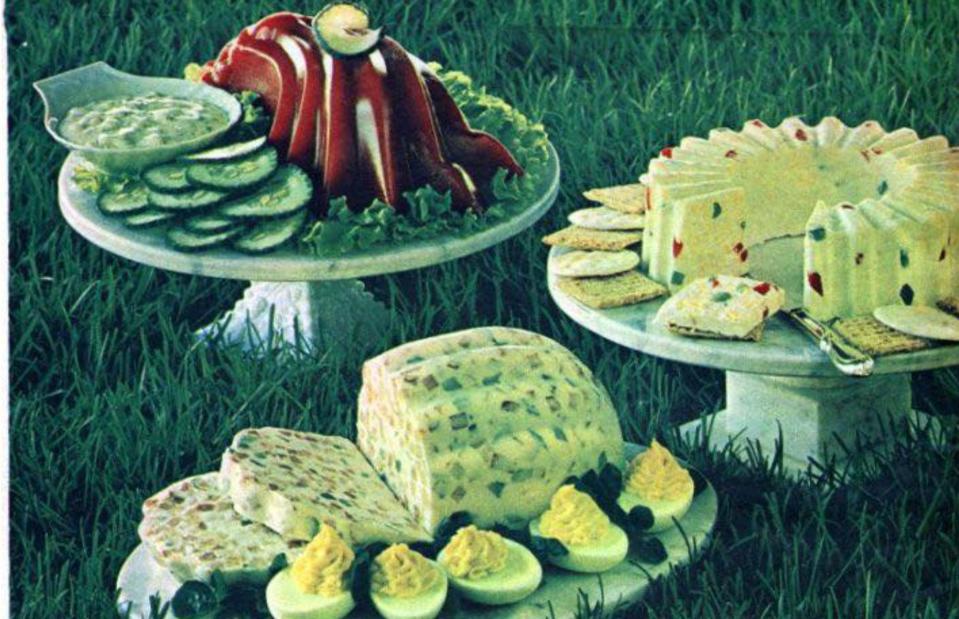
Badanduglyofretrofood/Facebook
Freezing pretty much anything in aspic was a huge trend in the mid-20th century when savoury jellies were hugely popular. Brands such as Knox Gelatine and Jell-O launched marketing campaigns that had us setting every meal, from tomato soup to cheese, in gelatine. Some are now saying the time is right for an aspic revival – and we can definitely imagine this visually striking cuisine wobbling its way back to popularity.
47. Blancmange

David Pimborough/Shutterstock
Thick and creamy, blancmange is a gelatine-based dessert that was eaten throughout the 20th century. British brand Pearce Duff had four pale, opaque flavours to choose from: strawberry, raspberry, chocolate and vanilla. You could try reviving this classic with fresh raspberries, raspberry liqueur, double cream, ground almonds and rose petals – although we still think it would be fun to put it in a novelty mould.
46. Tuna noodle casserole

AS Foodstudio/Shutterstock
Tuna noodle casserole was once a regular midweek fixture, whipped up using pantry staples and canned goods. A mixture of pasta, Campbell’s cream of mushroom soup, frozen peas, tuna and breadcrumbs, it was one hearty dish that was as fuss-free as it was tasty. For a modern take on the recipe, try swapping canned soup for fresh chicken stock, butter and cheese, and top your casserole with panko breadcrumbs.
45. Salisbury steak

AS Foodstudio/Shutterstock
Made by shaping minced beef into miniature meat loaves, Salisbury steak – served with mashed potatoes and gravy – was a staple cafeteria lunch and TV dinner in America in the 1970s. It was invented at the end of the 19th century by an American physician, who intended it as a digestion aid. However, by the end of the century, it was regularly accompanied by tater tots, instant mashed potatoes and other convenience foods – so the 'healthy' tag was rather lost. You could easily give this dish a modern makeover with sweet potato mash and homemade onion gravy.
44. Popcorn salad

Pixel-Shot/Shutterstock
If this dish sounds familiar, it's because a version of it went viral on the internet in 2021, thanks to a Food Network recipe by cookbook author Molly Yeh. People couldn't wrap their heads around the thought of putting popcorn in a salad – but actually, the idea is nothing new. The dish is an old Midwestern one that's been around for decades. For those who love savoury snacks, it's certainly one way to make salads more tempting.
43. Sülze
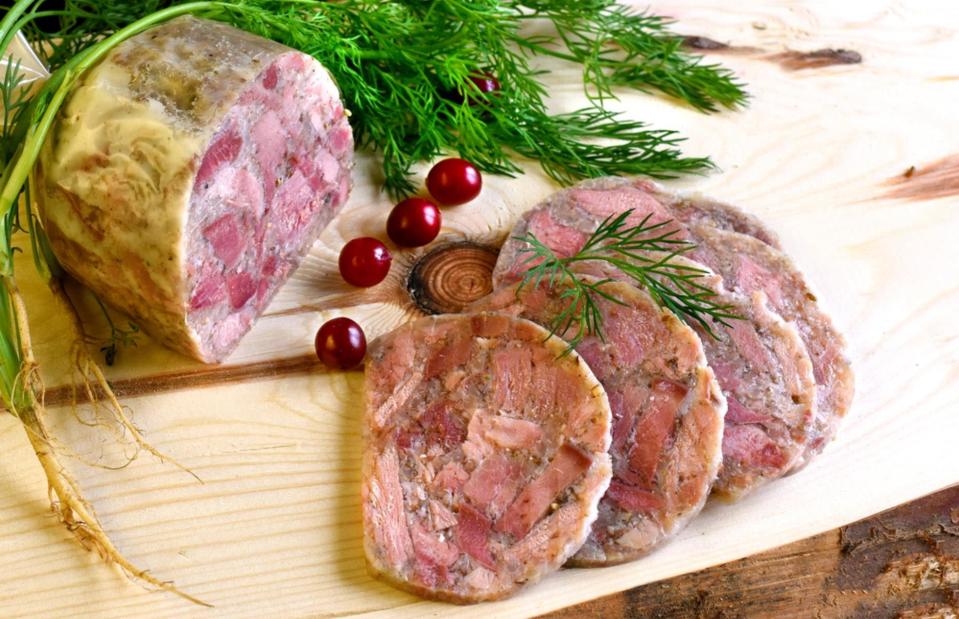
night flower/Shutterstock
This one's perhaps not for the faint of heart – or the delicate of stomach – but many consider it a delicacy. A meat jelly made from the head of a pig or calf, sülze is a German variety of head cheese (also known as brawn). The aspic jelly has a vinegary taste and often includes different herbs and spices. We think it's a classic example of nose-to-tail cooking that deserves another chance.
42. Crown jewel dessert
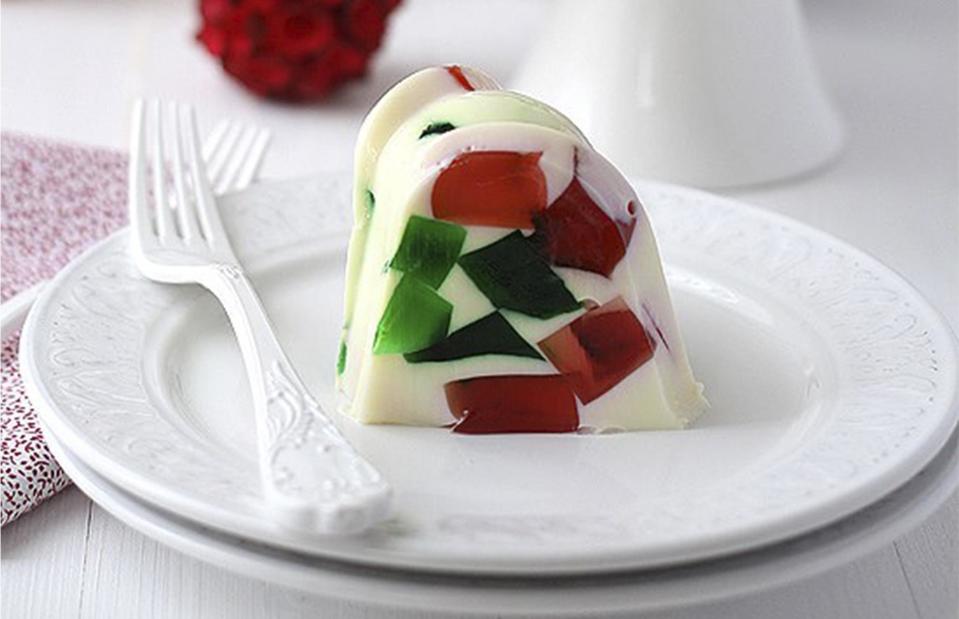
Jello/Facebook
Crown jewel dessert, also known as broken glass cake, is without a doubt a showstopper. The recipe was featured in a 1960s cookbook called Joys of Jell-O and calls for orange, cherry and lime Jell-O, cut into cubes and folded into a thick lemon cream – made from lemon Jell-O and Dream Whip (a branded whipped cream). If you’re not a fan of Jell-O but want to recreate the same look, give semifreddo a whirl.
41. Stuffed celery
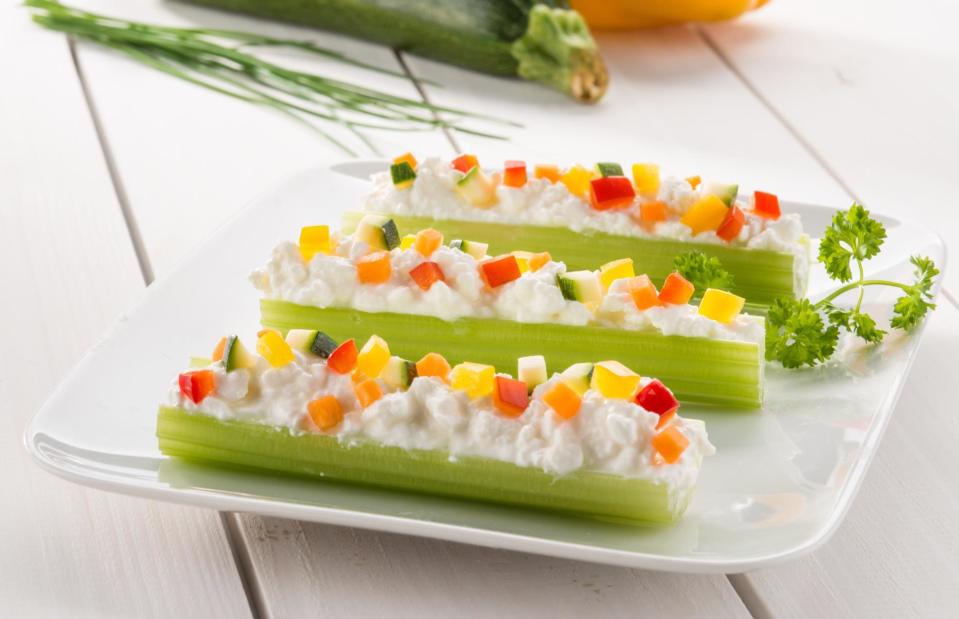
studiogi/Shutterstock
In the 1960s, a soirée simply wasn't a soirée without stuffed celery hiding somewhere on the buffet table. If you want to give it a go, pipe a filling of blue cheese, cream cheese, Worcestershire sauce and hot sauce into celery sticks. Garnish with whatever you fancy: black olives, parsley, paprika and crispy chicken skin are all great choices.
40. Potato salad pie
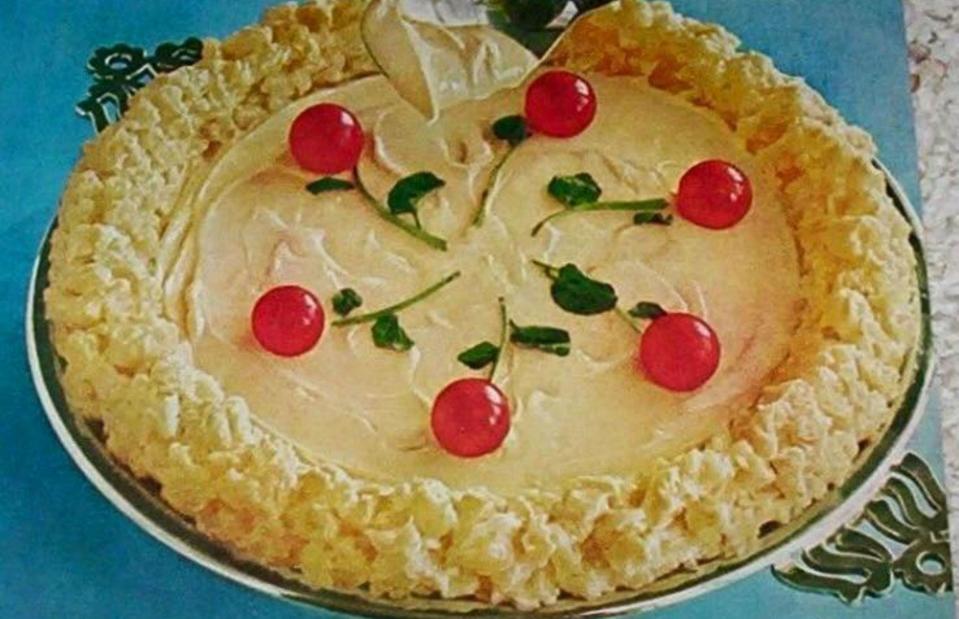
Badanduglyofretrofood/Facebook
Back in the day, potato salad was a must-have dish when feeding a crowd – and this 1964 Hellmann’s Mayonnaise advert in Holiday Magazine showed a stylish new way to present it. Here, cooked potatoes, celery, onions and parsley are shaped inside a pie base, topped with a generous layer of mayonnaise and garnished with tomatoes and watercress. It's a carb-loaded treat we'd love to get our hands on today.
39. Labskaus

Christin Klose/Shutterstock
A traditional sailor's meal from northern Germany, labskaus consists of corned or salted beef mixed with potato, beetroot and onion, served with a fried egg, gherkins and rollmop herring. A version of the dish made its way to Liverpool, England, in the 18th century, where it became known as 'scouse'. This is apparently why Liverpool's inhabitants have the nickname 'scousers'.
38. Cheese cones
![<p>Classic Film/Flickr [CC BY-NC 2.0]</p>](https://s.yimg.com/ny/api/res/1.2/D_65dmGO1vG2jkbIHfRH6g--/YXBwaWQ9aGlnaGxhbmRlcjt3PTk2MDtoPTYxOQ--/https://media.zenfs.com/en/lovefood_uk_306/51cb683d2c4afa57814be937c18e3418)
Classic Film/Flickr [CC BY-NC 2.0]
Cheese cones were a staple at Christmas gatherings in the 1970s. One recipe consisted of cream cheese, grated Parmesan, mayonnaise, oregano and garlic powder – while another featured shredded Cheddar, mayonnaise, horseradish and seasoning. They were shaped into logs and studded with almonds and walnut halves, so they resembled pine cones, then served alongside crisp Melba toasts and crudités.
37. Jell-O Under the Sea Salad
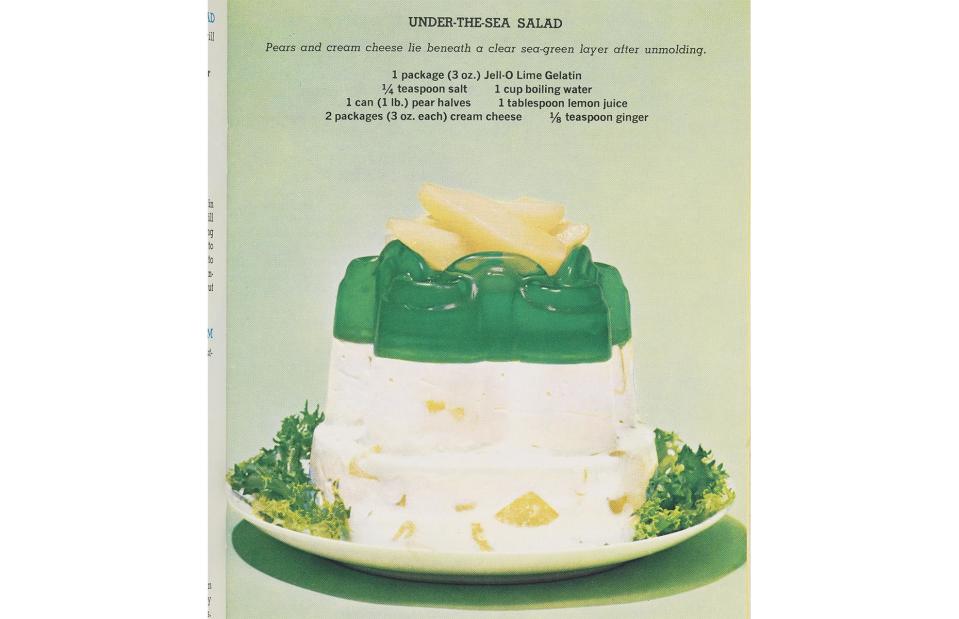
Wellcome Images, CC-BY-4.0, via Wikimedia Commons
In mid-century America, neither Jell-O nor salads were exclusively sweet or savoury, and dishes like Under the Sea Salad found their place on the buffet table somewhere between the main dishes and desserts. A recipe for this dish was featured in the Joys of Jell-O cookbook. Consisting of a cream cheese and pear base topped with lime Jell-O, it doesn’t sound half bad – maybe just skip serving it on the bed of salad leaves.
36. Fruit cocktail pudding

Yellyana/Shutterstock
A tinned mixture of pears, grapes, cherries and peaches (and later, pineapple), fruit cocktails took off around the 1930s. It was invented to stop the good parts of bruised fruit from going to waste, but clever marketing had us viewing it as a speedy and sophisticated dessert. A recipe from Jell-O in the late 1950s suggests alternating layers of vanilla pudding and whipped cream with the fruit mix in a dessert glass.
35. Cheese balls
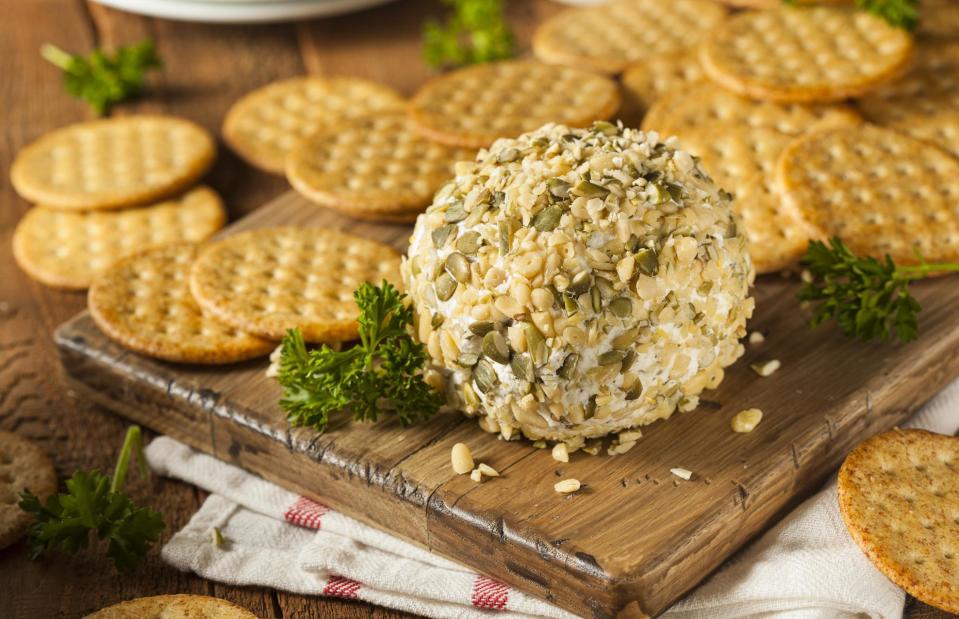
Brent Hofacker/Shutterstock
Look to the 1970s for party snack inspiration and whip up a trio of cheese balls for your next gathering. Blend cream cheese with blue cheese, Cheddar, pink salmon or crushed pineapple, shape into balls, then roll in walnuts, pine nuts and parsley – or make up your own recipe based on your favourite ingredients. You can prepare them ahead of time and store them in the fridge until your guests arrive.
34. Duchess potatoes

from my point of view/Shutterstock
Duchess potatoes were the hottest side dish of the 1960s and 1970s. They're simple to make; roast Russet potatoes, pass through a ricer, enrich with egg yolk, butter and nutmeg, then pipe onto a baking tray. They’re traditionally shaped into little stars or spiral mounds, brushed with egg yolk, then baked until crisp on the outside and fluffy in the centre. Try serving them with roast beef as an alternative to roast potatoes.
33. Sauerbraten
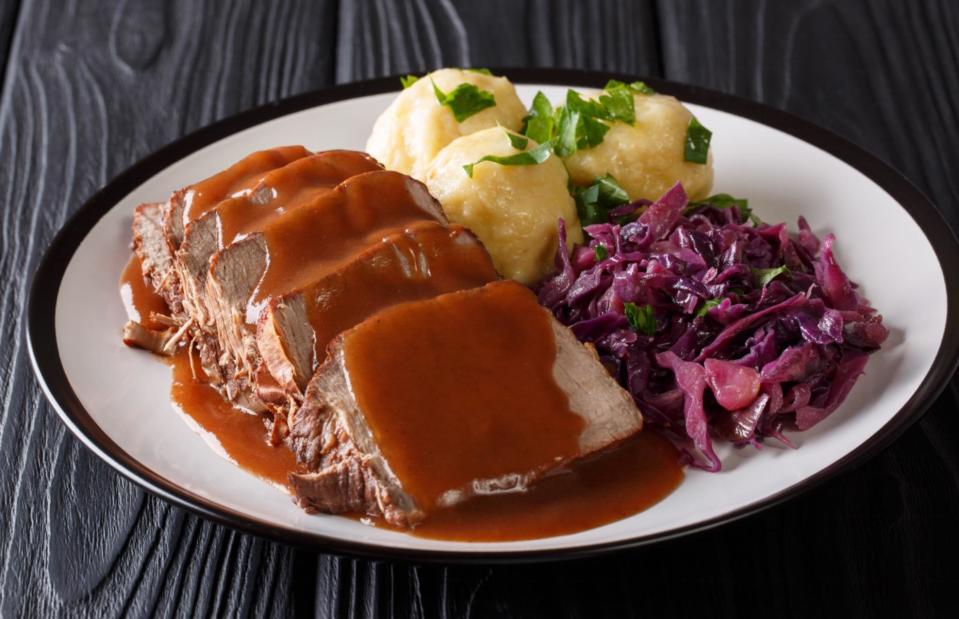
AS Foodstudio/Shutterstock
A national dish of Germany, sauerbraten dates back hundreds of years. It's thought to have lofty origins, with some believing medieval emperor Charlemagne invented it to use up leftover meat, and others crediting Julius Caesar himself. Translated into English as 'sour roast', sauerbraten is made by marinating meat for up to 10 days in a mix of wine, vinegar and spices. It's served with a sweet and sour gravy, often featuring crumbled-up ginger snap biscuits.
32. Ham in parsley aspic
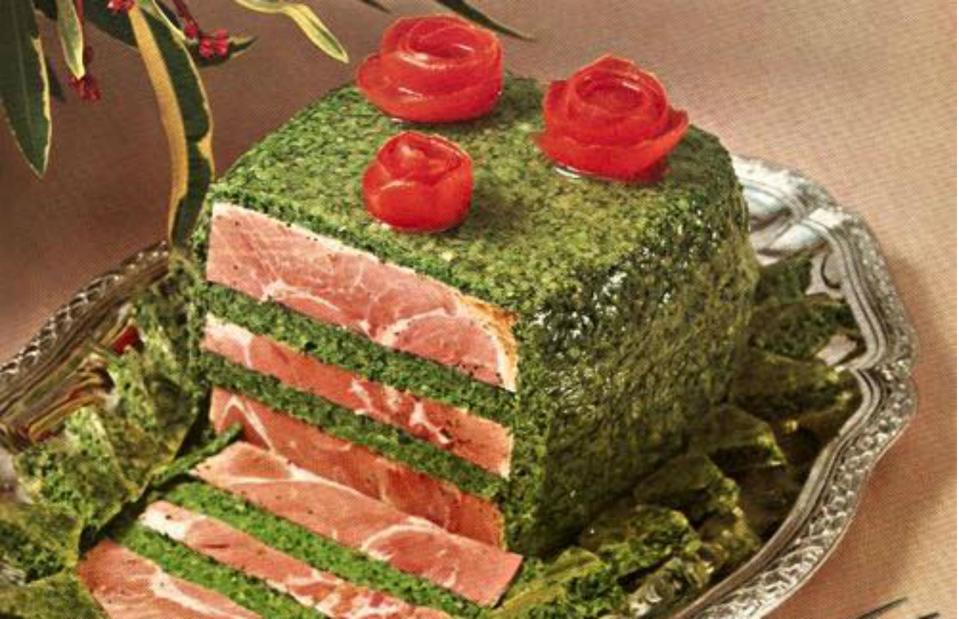
Badanduglyofretrofood/Facebook
Food in the 1960s was heavily influenced by pioneering cooks such as Julia Child, who brought the joys of French-inspired cuisine to the masses. Jambon persillé en gelée – known in English as ham in parsley aspic – is a fine example. Bright green, with optional tomato roses on top, it may look unusual, but it's surprisingly delicious.
31. Quiche Lorraine
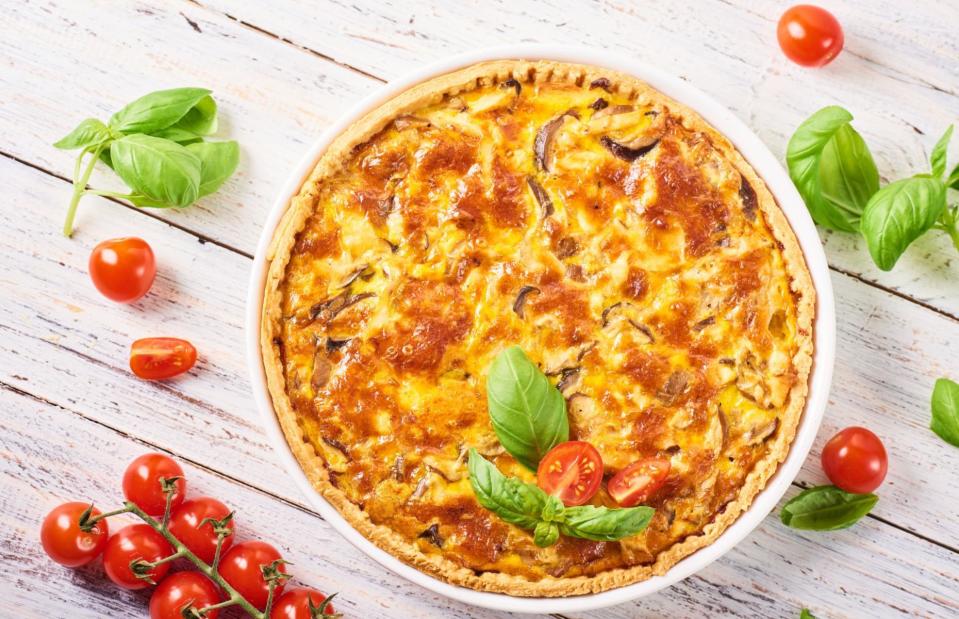
Agave Studio/Shutterstock
A recipe for quiche Lorraine appeared in Julia Child's 1968 cookbook, The French Chef Cookbook – and just like that, the cheesy, creamy delight became one of the most popular dishes around. Sumptuously rich and savoury, it contains crispy bacon lardons, Gruyère (or Emmental or Cheddar, if you prefer), eggs and cream, all bound together in a pastry case. We'd love to see it make a return to lunch tables soon.
30. Peach melba

Alexander Prokopenko/Shutterstock
Peach Melba is a simple but rather beautiful dessert of sweet poached peaches and tart raspberry sauce, served with vanilla ice cream. Created by Auguste Escoffier at The Savoy in London at the end of the 19th century, it was named after Australian opera star Dame Nellie Melba. These days you’re unlikely to find it on dessert menus, but we think the simple combination of fruit and ice cream is timeless.
29. Apricot chicken

Robyn Mackenzie/Shutterstock
Satisfying and easy to make – with not too many ingredients required – apricot chicken was a staple in Australian households in the 1970s. Back in the day, it consisted of chicken legs and thighs with French onion soup and apricot nectar, poured over rice. Give it a new lease of life and make a Middle Eastern–style chicken and apricot tagine, with cinnamon, ginger, turmeric, almond slices and fresh herbs.
28. Toast Hawaii
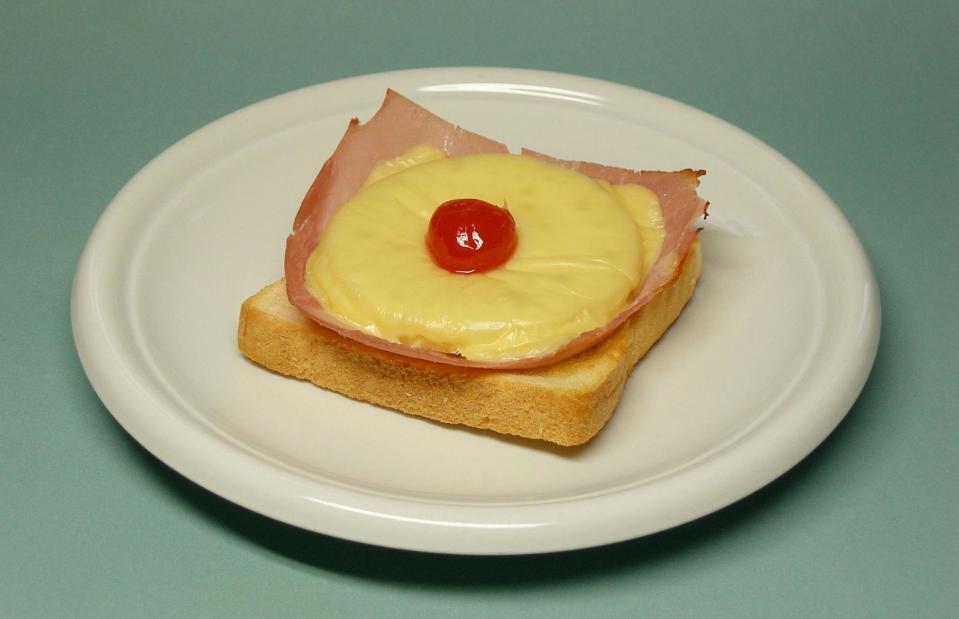
Rainer Zenz, CC BY-SA 2.0, via Wikimedia Commons
We all know how divisive ham and pineapple pizzas can be. But how about the same combo on toast, with melted cheese and a cherry on top? This unusual combination became popular in Germany in the 1950s thanks to TV chef Clemens Wilmenrod – and it was a common sight in the country's cafés and restaurants up until the 1980s. If Hawaiian pizza is still going strong, we think there's room for this dish to make a comeback too.
27. Charlotte Russe
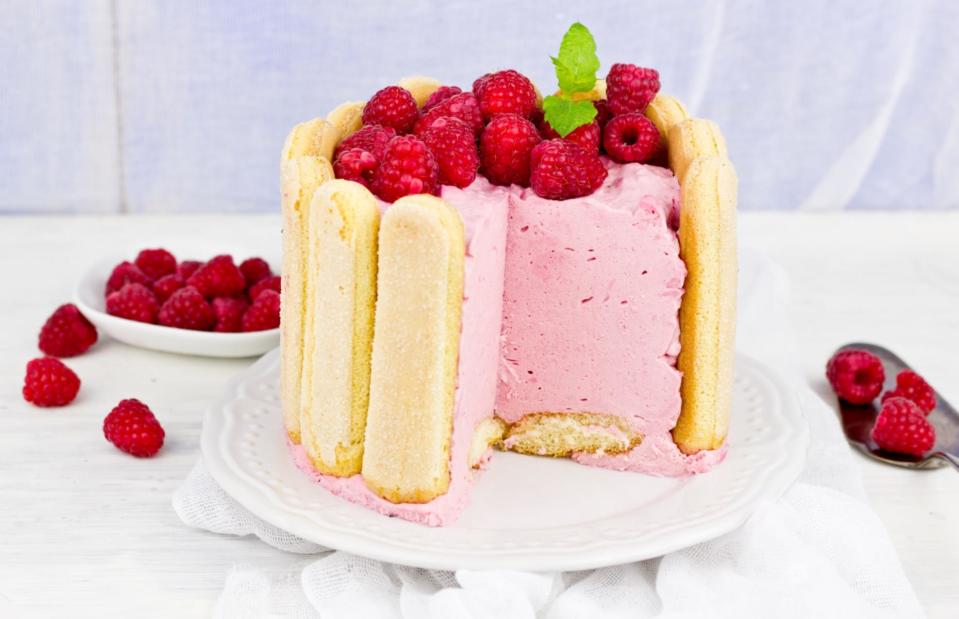
Nigina Sharipova/Shutterstock
Invented in France in the 18th century, Charlotte Russe is a dessert that enjoyed renewed popularity in the early 20th century. Featuring a set cream filling, it was originally made by lining a cake mould with stale bread, but sponge cake or ladyfingers gradually became the favoured choice. Later, a simplified version – consisting of a thin square of vanilla sponge, a tall spiral of whipped cream and a maraschino cherry, served in a cardboard cup – became popular in New York's Jewish bakeries.
26. Bananas Foster
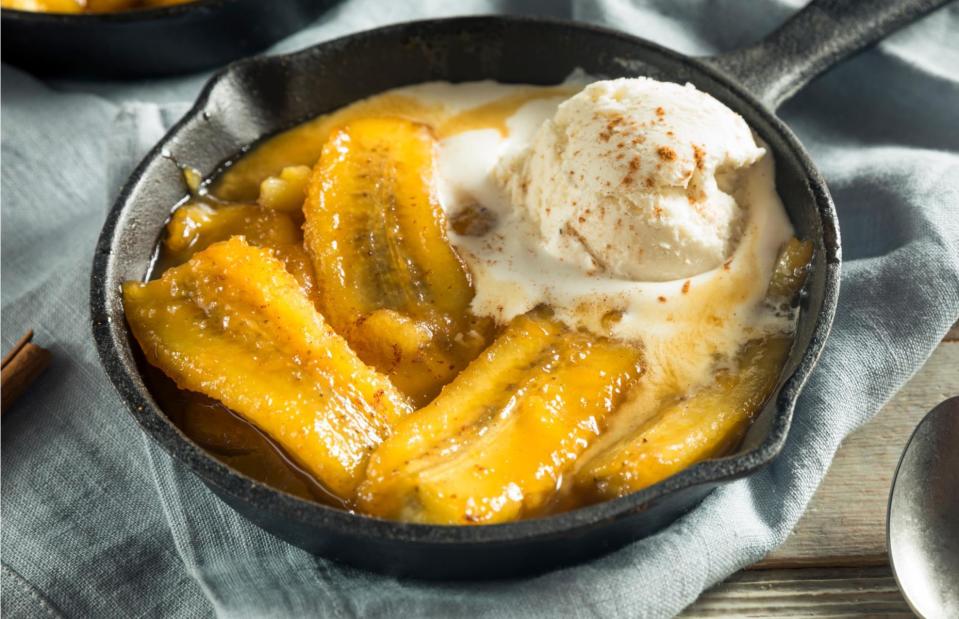
Brent Hofacker/Shutterstock
In the early 1950s, New Orleans was a major import hub for bananas, and the story goes that a chef at local restaurant Brennan’s was challenged to invent a dish using the fruit. His creation – bananas flambéed with brown sugar, butter, cinnamon, dark rum and banana liqueur, and served with ice cream – was a roaring success. Bananas Foster is still served at Brennan’s today, but we'd like to see it brought back everywhere.
25. Pineapple upside-down cake

Lesya Dolyuk/Shutterstock
According to food historians, the term 'upside-down cake' first appeared in the late 1800s. However, it wasn't until the early 20th century that the pineapple upside-down cake began to pop up in magazines and cookbooks, following the introduction of canned pineapple. The dessert hit its peak in the 1960s and, while upside-down cakes are still around today, they're usually made using different fruit. We say bring back the retro appeal of the original, with whole pineapple rings and glacé cherries.
24. Chicken à la King

Tanis Saucier/Shutterstock
Invented at the start of the 20th century, chicken à la King became a popular wedding dish in the 1950s and 1960s. Written about by James Beard and The New York Times’ Craig Claiborne, it reached its peak in the 1970s and 1980s but disappeared from most menus shortly after. To make it, chicken is cooked in a creamy sauce with mushrooms and peppers, then served with rice, pastry or toasted bread.
23. Lobster thermidor

Bill Gozansky/Alamy Stock Photo
Lobster thermidor has been a classic since it was invented in France in 1894 to celebrate the opening of dramatist Victorian Sardou's play, Thermidor. It features tasty chunks of lobster tossed in an indulgent sauce then popped back in its shell, heavily doused with cheese and baked until hot and delicious. Perhaps the reason why lobster thermidor is no longer on so many menus is because the main ingredient is so expensive these days.
22. Jelly and ice cream
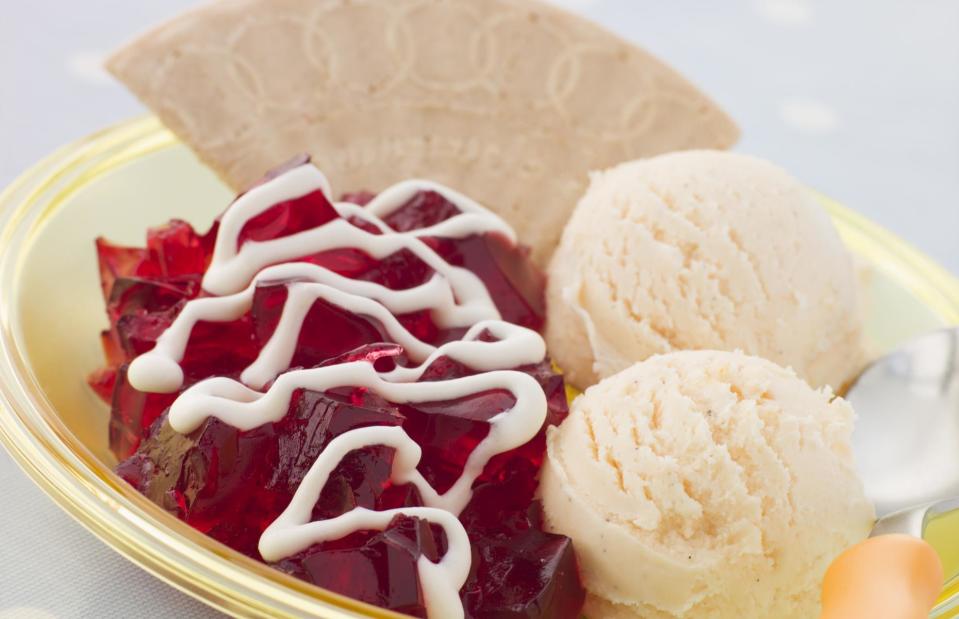
Monkey Business Images/Shutterstock
In the UK, no birthday party in the 1980s or 1990s was complete without a bowl of strawberry jelly, served with a scoop of vanilla ice cream. This childhood dish may not have been sophisticated, but it sure was delicious. We know it's all about fancy gelato flavours these days, but we think this simple combo is a classic that's worth revisiting.
21. Banoffee pie

alexanderon/Shutterstock
Despite its huge popularity in the US throughout the 1990s, this super-sweet, super-indulgent dessert was actually invented in England in the 1970s at The Hungry Monk Restaurant in East Sussex. A genius ensemble of gooey, sticky, creamy ingredients, banoffee pie sees sliced bananas, a toffee-like caramel sauce and whipped cream layered over a buttery biscuit base, then showered in chocolate shavings. Easy to make and deliciously decadent, it's still a fun treat to throw together at home.
20. Pasta primavera
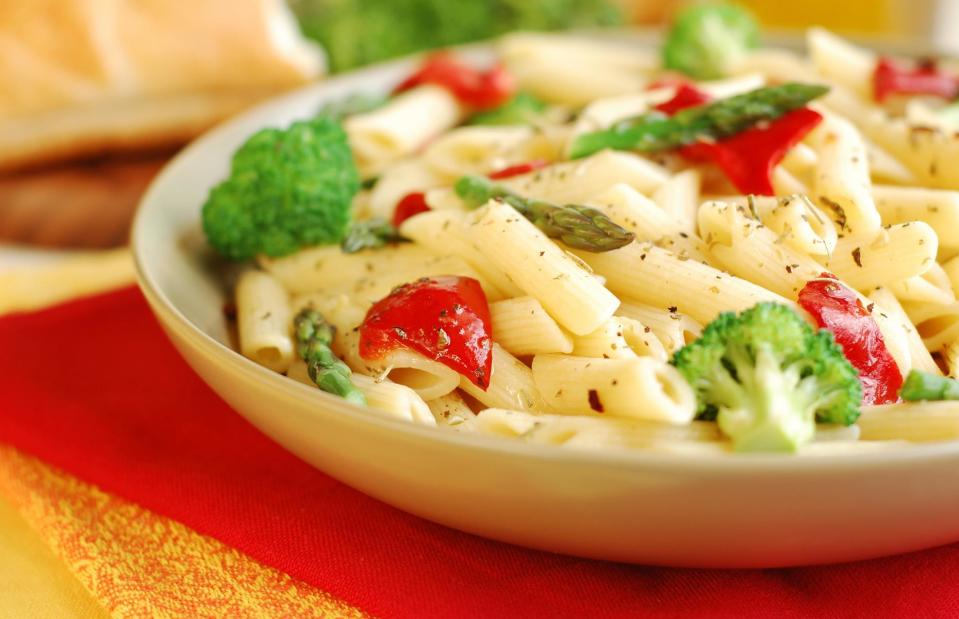
cobraphotography/Shutterstock
In the late 1970s, legendary New York restaurant Le Cirque popularised pasta primavera: a creamy pasta dish brimming with broccoli, courgette, asparagus and beans. The world has embraced lots of different pasta dishes since then, but this one's still a classic. Want to cook it at home? Simply make a sauce with butter, lemon and Parmesan, then throw in whatever cooked vegetables you fancy.
19. Chicken Tetrazzini
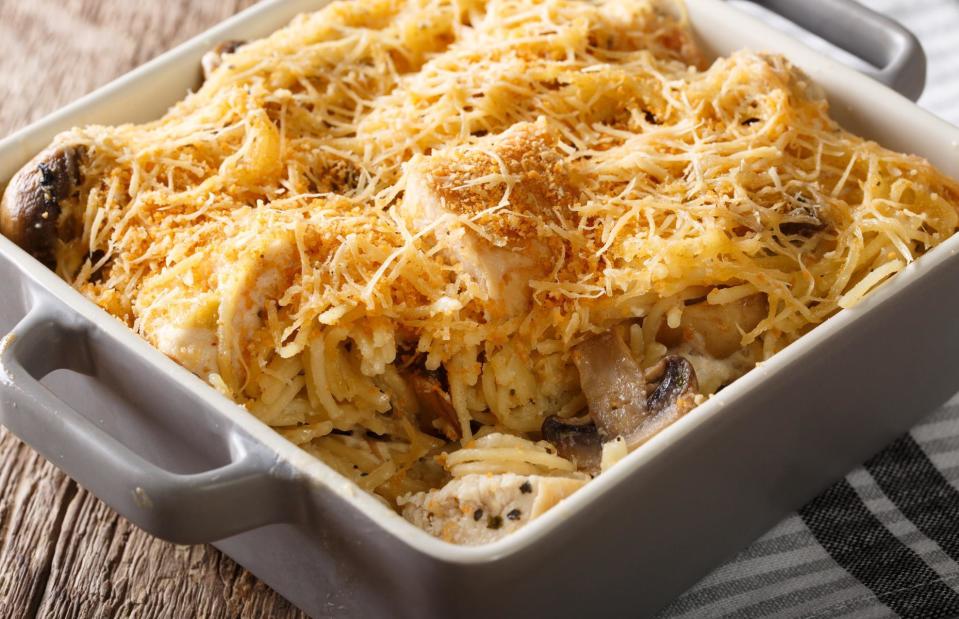
AS Food studio/Shutterstock
Chicken Tetrazzini was one of the most popular dishes in America for much of the 20th century. It’s widely believed that it was invented by a chef at a swanky San Francisco hotel, inspired by opera singer Luisa Tetrazzini. An extremely rich dish of chicken, mushrooms, Parmesan and cream sauce, it's baked in a casserole dish until golden on top. By the second half of the century, it was a shadow of its former self, as home cooks replaced fresh ingredients with tinned versions. Bring back the original, we say!
18. Surf and turf
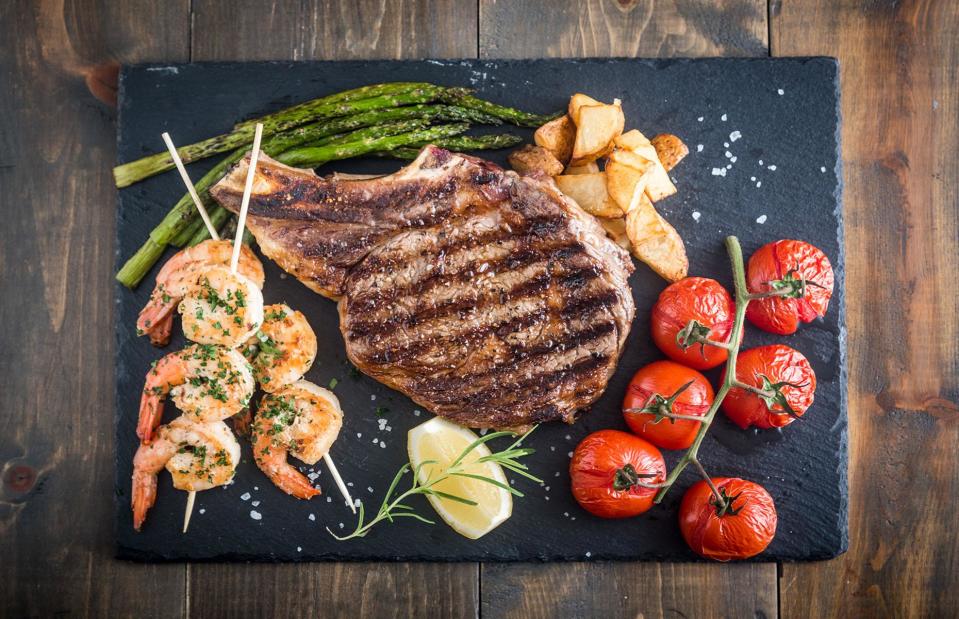
Atsushi Hirao/Shutterstock
Back in the 1960s, surf and turf was a staple dish at steakhouses and fancy restaurants, where it was often the most expensive dish on the menu. A decadent platter of red meat (usually steak) and seafood (perhaps lobster or prawns), it combined two pricey dishes in one, so it was the dish if you wanted to show off. Want to get a taste of this indulgent pairing without feeling like you've stepped back in time? Try a surf and turf burger: a beef patty topped with prawns, all slotted into a bun.
17. Spaghetti casserole
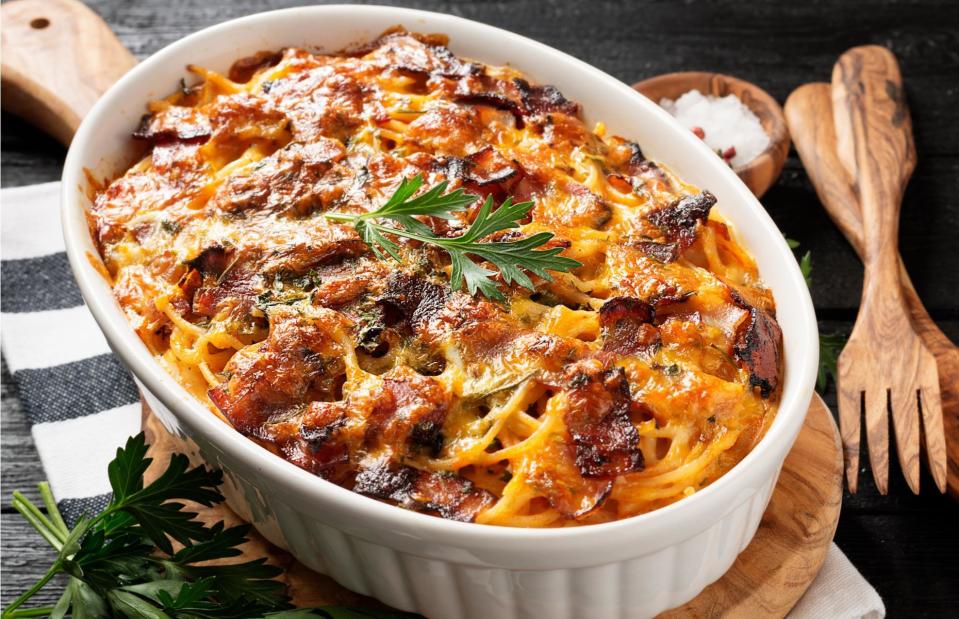
nelea33/Shutterstock
The 1950s saw an explosion of budget-friendly, filling and easy-to-freeze casserole dishes that were a great way to recycle leftovers and stretch them into a second meal to feed the family. Spaghetti casserole was a go-to option, with layers of spaghetti, minced beef, vegetables, tinned soup and grated cheese. Why not try resurrecting the recipe for a different take on spaghetti Bolognese?
16. Cherries Jubilee
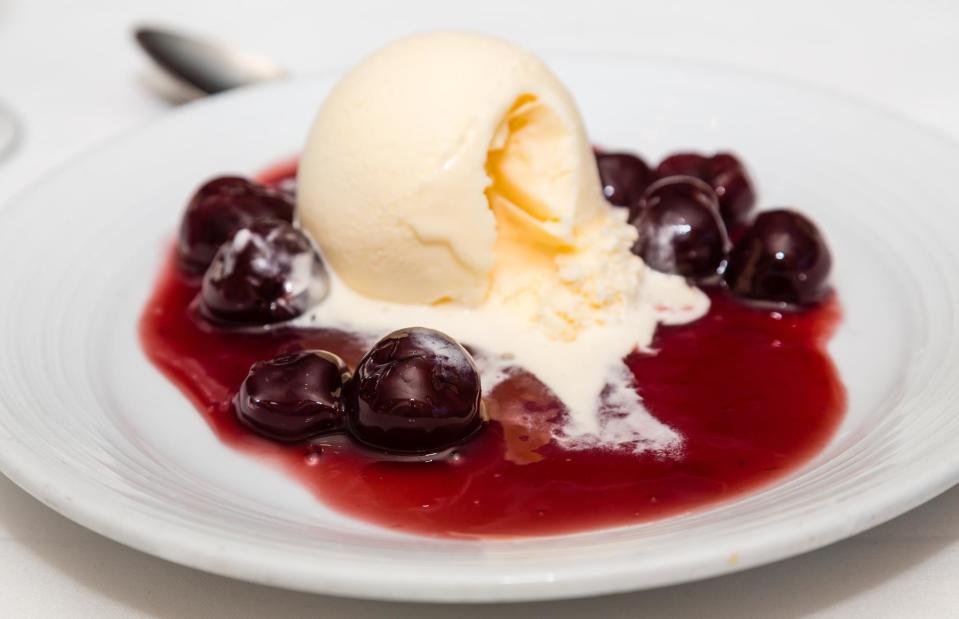
Darryl Brooks/Shutterstock
Cherries Jubilee is a theatrical dish generally credited to Auguste Escoffier, who is said to have created the dessert for Queen Victoria’s Golden Jubilee celebration in 1887. To make it, whole cherries are cooked in liqueur, flambéed and served with vanilla ice cream. Cherries Jubilee hit its peak in the 1950s and 1960s, when home cooks wowed their guests by making it a spectacular dinner party finale. It may have fallen out of favour, but we think it still makes a wonderfully rich, tasty dessert.
15. Cheeseburger pie
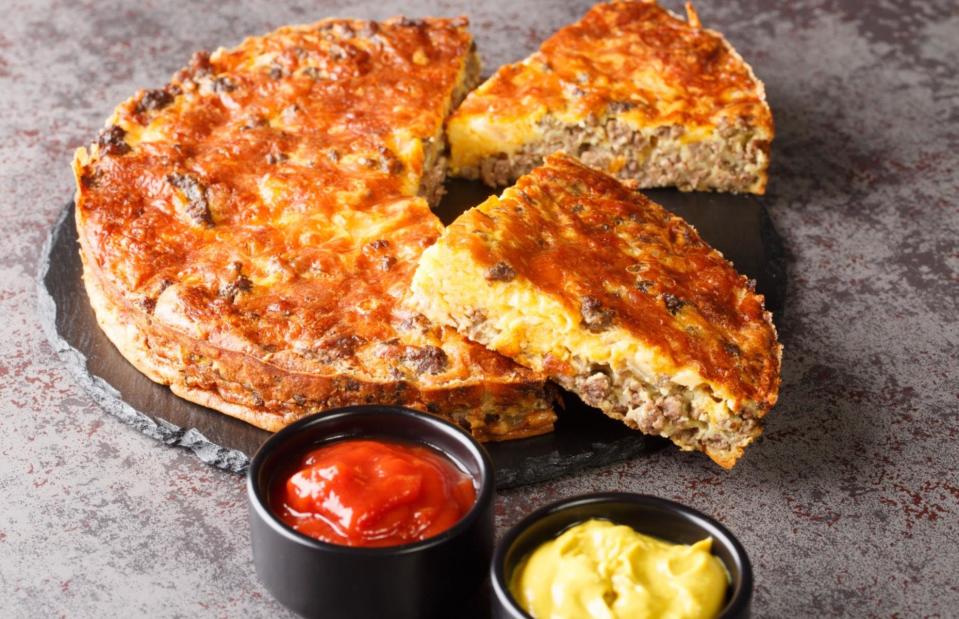
AS Foodstudio/Shutterstock
If you can't decide between a cheeseburger and a pie, why not have both? The genius cheeseburger pie became popular in the 1970s, all thanks to a Betty Crocker recipe. Consisting of a mixture of minced beef, onions, ketchup, mustard and Worcestershire sauce, this hearty dish comes layered with classic burger ingredients such as tomato, gherkins and, of course, cheese. What's not to love?
14. Devilled eggs
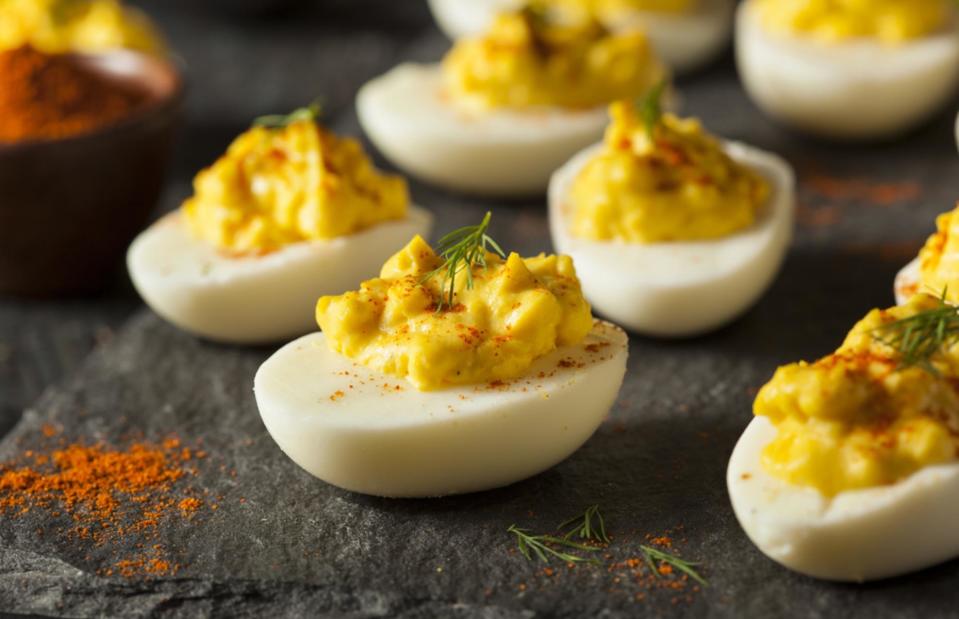
Brent Hofacker/Shutterstock
A staple of the 1970s dinner party scene, devilled eggs are too cute not to have a revival. A little fiddly to make (but totally worth it), they involve scooping the yolks from hard-boiled eggs, mixing with mustard, mayonnaise, paprika and sometimes other ingredients, then piping the mixture back into the eggs. Delicate, tasty and crowd-pleasing, they're the perfect bite-sized canapés.
13. Crêpes Suzette
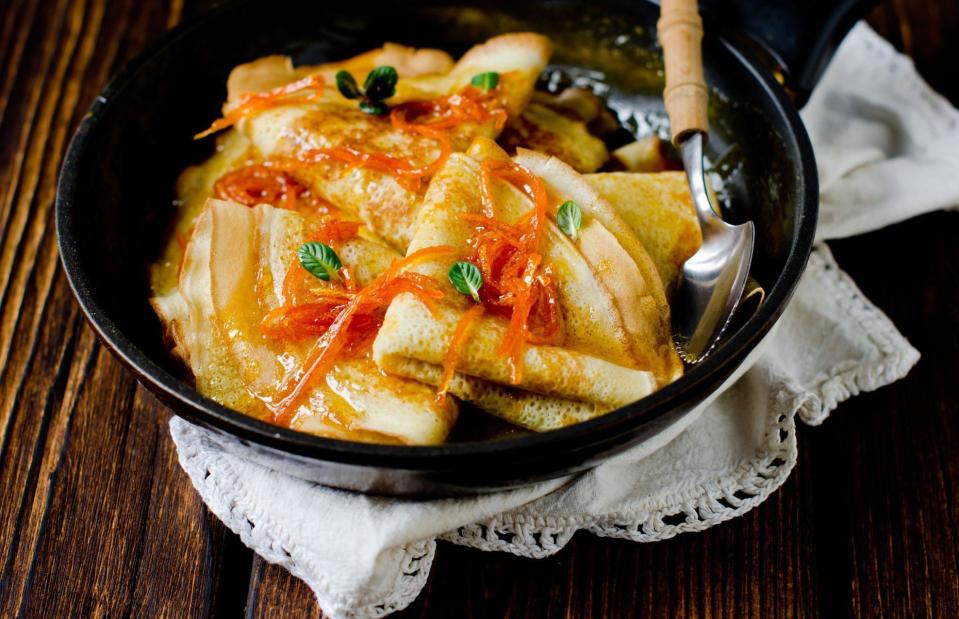
Teleginatania/Shutterstock
Desserts don't get showier than classic French dish crêpes Suzette. Traditionally prepared tableside at high-end restaurants by waiters in smart jackets, this spectacular dish sees pancakes doused in a mixture of caramelised sugar, butter, orange juice and orange zest, splashed with orange liqueur, then set aflame. It's now mostly relegated to the most old-school restaurants and retro-themed dinner parties. A word of warning if you do try this at home: make sure there's a fire extinguisher nearby!
12. Vol-au-vents
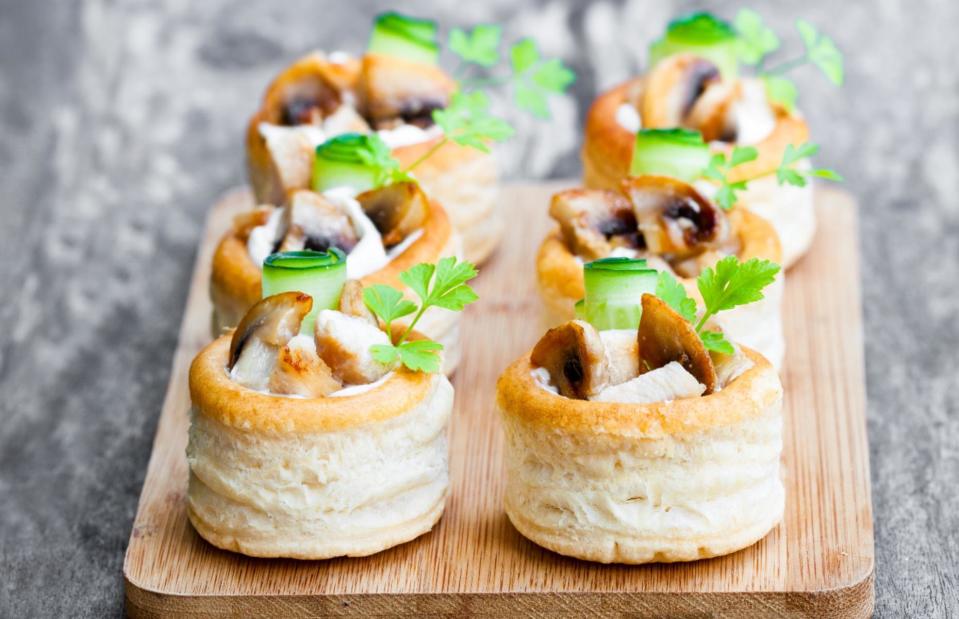
Elena Zajchikova/Shutterstock
It was once the height of sophisticated hosting to fill puff pastry cases with cooked mushrooms, coronation chicken or prawn mayonnaise to create a platter of vol-au-vents. We think pastry-based starters or snacks should always be in fashion, so give this retro dish a makeover by updating the fillings. Pesto, hot smoked salmon and Stilton and mushrooms would all work perfectly.
11. Grape jelly meatballs
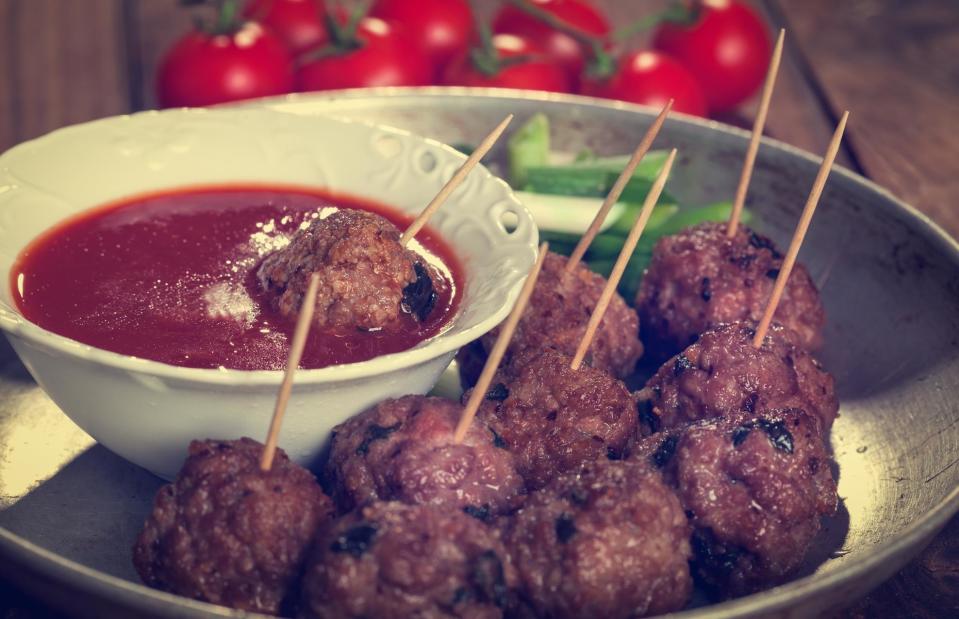
circlePS/Shutterstock
Old-school though they may be, grape jelly meatballs shouldn't be confined to the 1970s. To make these tempting appetisers, cocktail-sized meatballs (use shop-bought or make your own) are slow cooked in a sticky grape jam and chilli sauce mix. You could also add a pinch of paprika for added smokiness, if you fancy it.
10. Beef Stroganoff
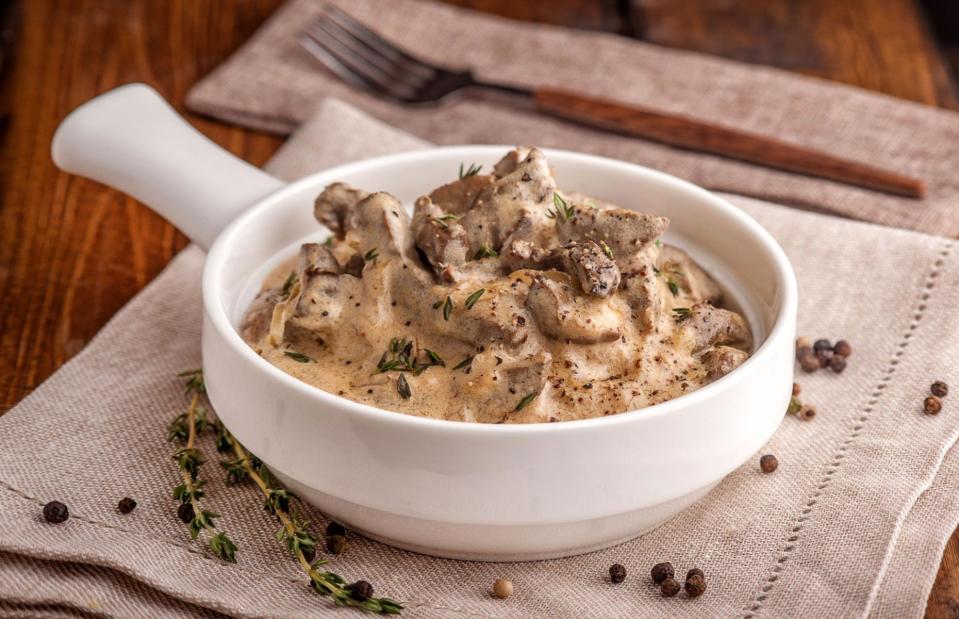
Valkyrielynn/Shutterstock
Named after Russian nobleman Count Pavel Stroganoff, this comfort food classic is said to have been invented by a French chef back in the 19th century – but really took the world by storm in the 1960s and 1970s. Traditionally, it's made by coating sautéed beef in a sauce of mustard, onions and sour cream, but many 20th-century recipes introduced mushrooms to the mix. Made well (that's without the can of condensed mushroom soup), it's a recipe that's always worth revisiting.
9. Duck à l’orange
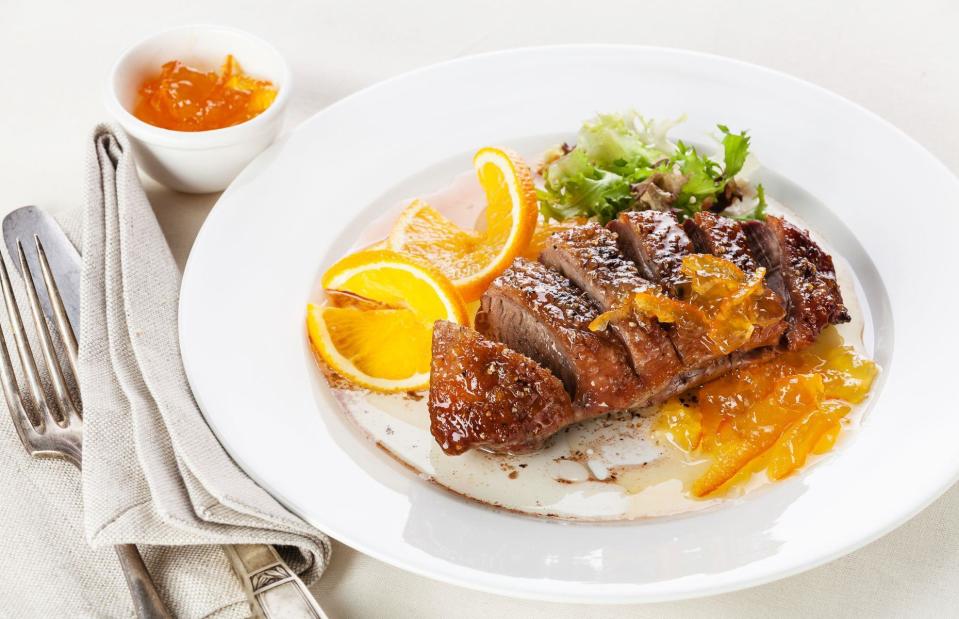
Natalia Lisovskaya/Shutterstock
Classic French dish duck à l’orange was considered the height of sophistication in the 1960s, when TV chef Julia Child brought it to the attention of US and UK gourmets. A taste bud–tingling combination of sweet, sour and savoury flavours, it's a dish that not only tastes wonderful, but can also be plated up prettily – so it's no wonder it became an instant hit at fine dining restaurants. Despite its deliciousness, it's a main course you rarely see on menus these days. Maybe it's time to resurrect the recipe at home?
8. Vichyssoise
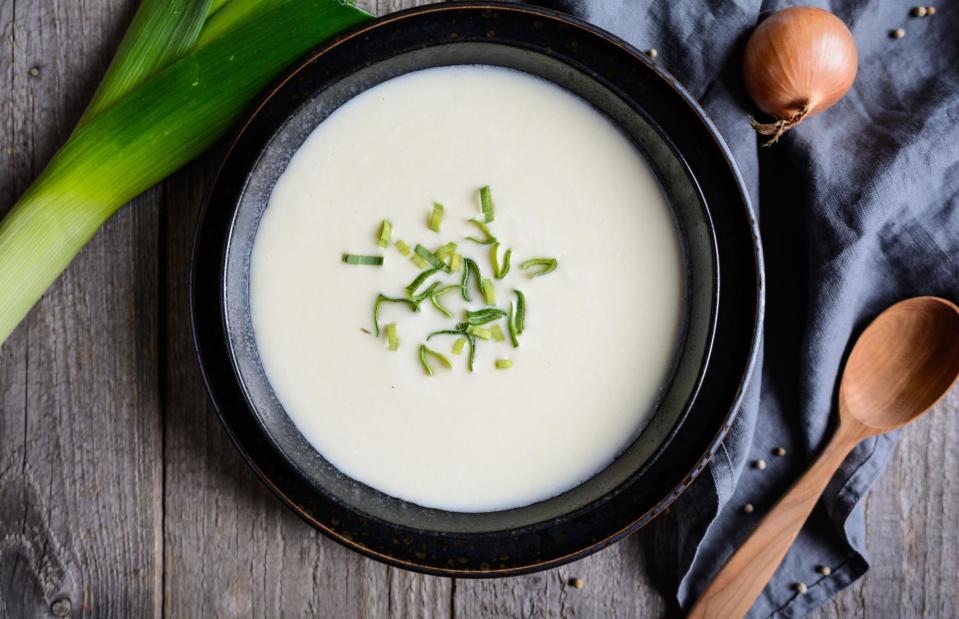
NoirChocolate/Shutterstock
One of the most popular dishes of the 1950s and 1960s was vichyssoise, a chilled soup of leeks, onions and potatoes, blended into a purée with chicken stock and cream. Despite its French name, it’s believed to be an American invention from the kitchen at the Ritz Carlton New York. By the 1970s, it was sold in tins – but its popularity nosedived following a botulism outbreak, in which one person died from a batch produced by Bon Vivant. Regardless of whether tins of the stuff come back into fashion, we think it’s time this refreshing soup was served again.
7. Steak Diane
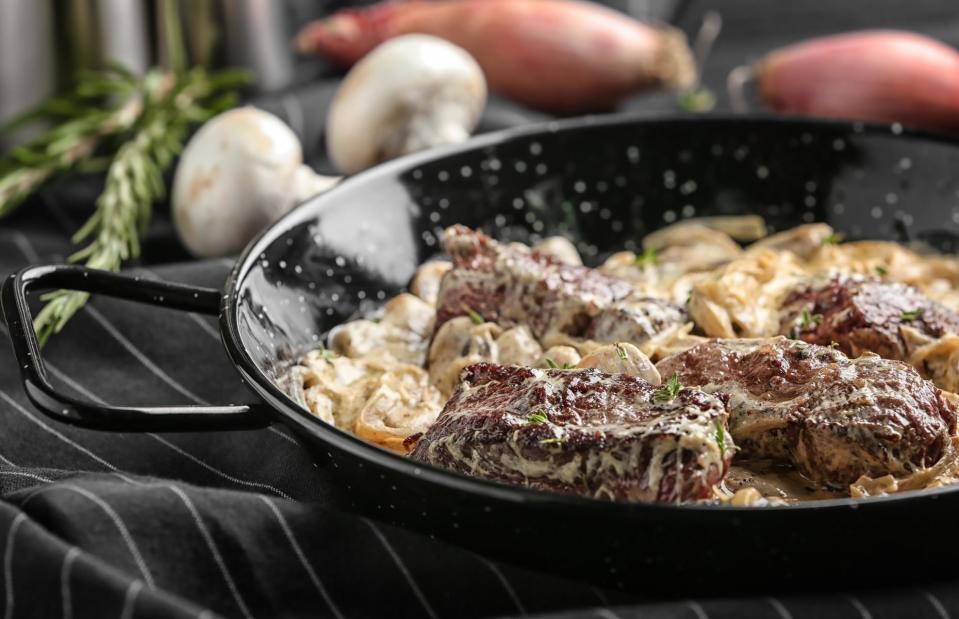
Africa Studio/Shutterstock
Throughout the 1950s and 1960s, steak Diane was one of the most luxurious dishes you could order at restaurants and epitomised Continental glamour. Dairy and meat had been rationed during World War II, so it was the height of luxury to enjoy butter and beef in the same dish. It was flambéed tableside, and the sauce contained shallots, Worcestershire sauce, Dijon mustard, stock, Cognac and black pepper. The dish fell out of fashion in the late 1970s, but we think it should grace menus once more.
6. Prawn cocktail

Brent Hofacker/Shutterstock
Wildly popular at fancy dinner parties and soirées from the 1960s to the 1980s, prawn cocktails featured a refreshing mix of juicy shellfish, tangy Marie Rose sauce (mayonnaise and ketchup) and lettuce, served with a lemon wedge on the side. Sadly, though, this once ubiquitous hors d'oeuvre fell out of fashion at the turn of the 21st century and has gained a reputation for being somewhat passé. We think it deserves a new lease of life – after all, it's tasty, relatively healthy and looks great, too.
5. Banana split
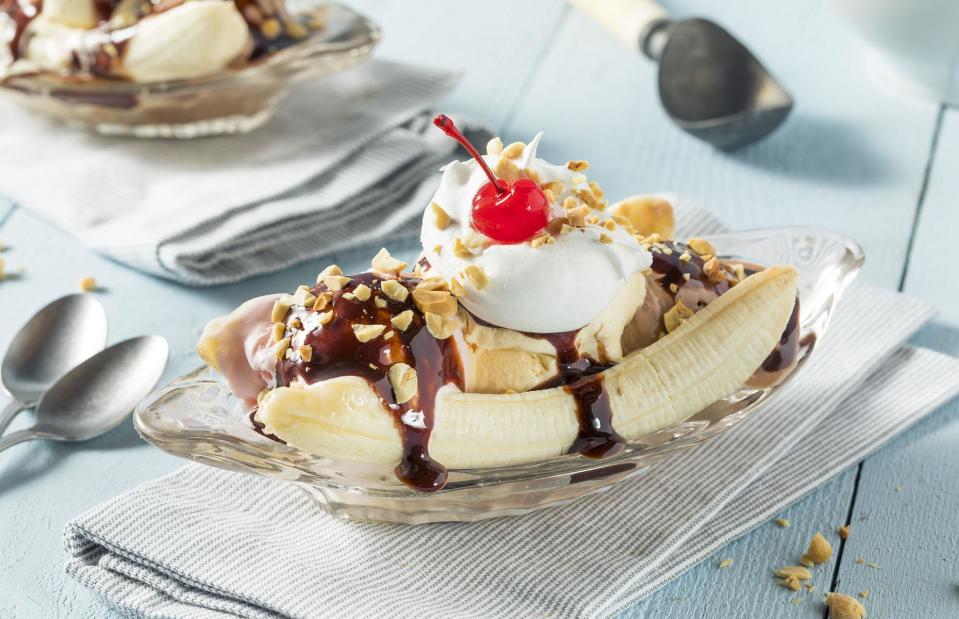
Brent Hofacker/Shutterstock
Back in the 1950s, banana splits were all the rage at soda fountains in the US, not to mention restaurants around the world. Tempted by the photo? Here's how to make one: simply halve a banana lengthways, pile on a trio of vanilla, chocolate and strawberry ice cream, add a sauce of your choice (pineapple, chocolate and strawberry are traditional), then top with whipped cream, chopped nuts and a cherry.
4. Black Forest gâteau
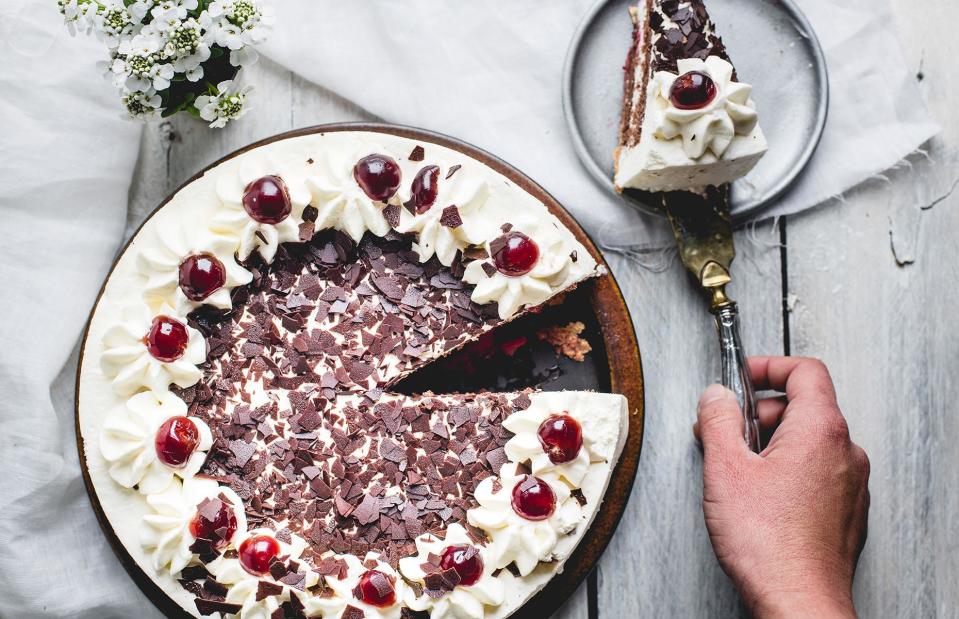
Benita Kuszpit/Shutterstock
We can't imagine why this gorgeous chocolate cake, complete with layer upon layer of cherries and whipped cream isn't as popular today as it was back in the 1970s. Known as Schwarzwälder Kirschtorte in Germany, where it was invented, it looks stunning and tastes even better. It's only a matter of time before this one makes a major comeback, surely?
3. Fondue

stockcreations/Shutterstock
We're not entirely sure why a big vat of molten cheese ever went out of fashion, but we'd definitely like to see fondue back on the dinner table soon – and not just in ski resorts. It makes the perfect dip for chunks of bread, potatoes, leftover roasted vegetables and more. Fondue as we know it dates back to the 1800s, but it was particularly popular in the 1970s. The perfect dessert to follow? Chocolate fondue, obviously.
2. Chicken Kyiv

DronG/Shutterstock
In 2024, a poll of foodies found that chicken Kyiv is one of the most nostalgic dishes for people in the UK. The dish has a long history around the world, of course, but in the UK, it was a dinner party favourite in the 1970s and 1980s. In fact, it was the first ready meal put out by iconic British retailer Marks & Spencer in 1979. To make it, chicken breast is stuffed with a garlicky herb butter, coated in breadcrumbs and fried or baked to perfection. The dish has been out of fashion for so long now it's surely due a comeback.
1. Baked Alaska

Brent Hofacker/Shutterstock
Contrary to what you may think, baked Alaska was actually invented in New York. Famous NYC haunt Delmonico's created the dish to celebrate Alaska becoming part of the United States in 1867. And here's another fun fact: it was originally called 'Alaska, Florida' because it has both hot and cold components. The fabulous dessert is out of style now, unfortunately, but it's an extravagant showstopper that would wow guests at any party.
Now discover the old-school ingredients we think are due a revival
Last updated by Luke Paton.


